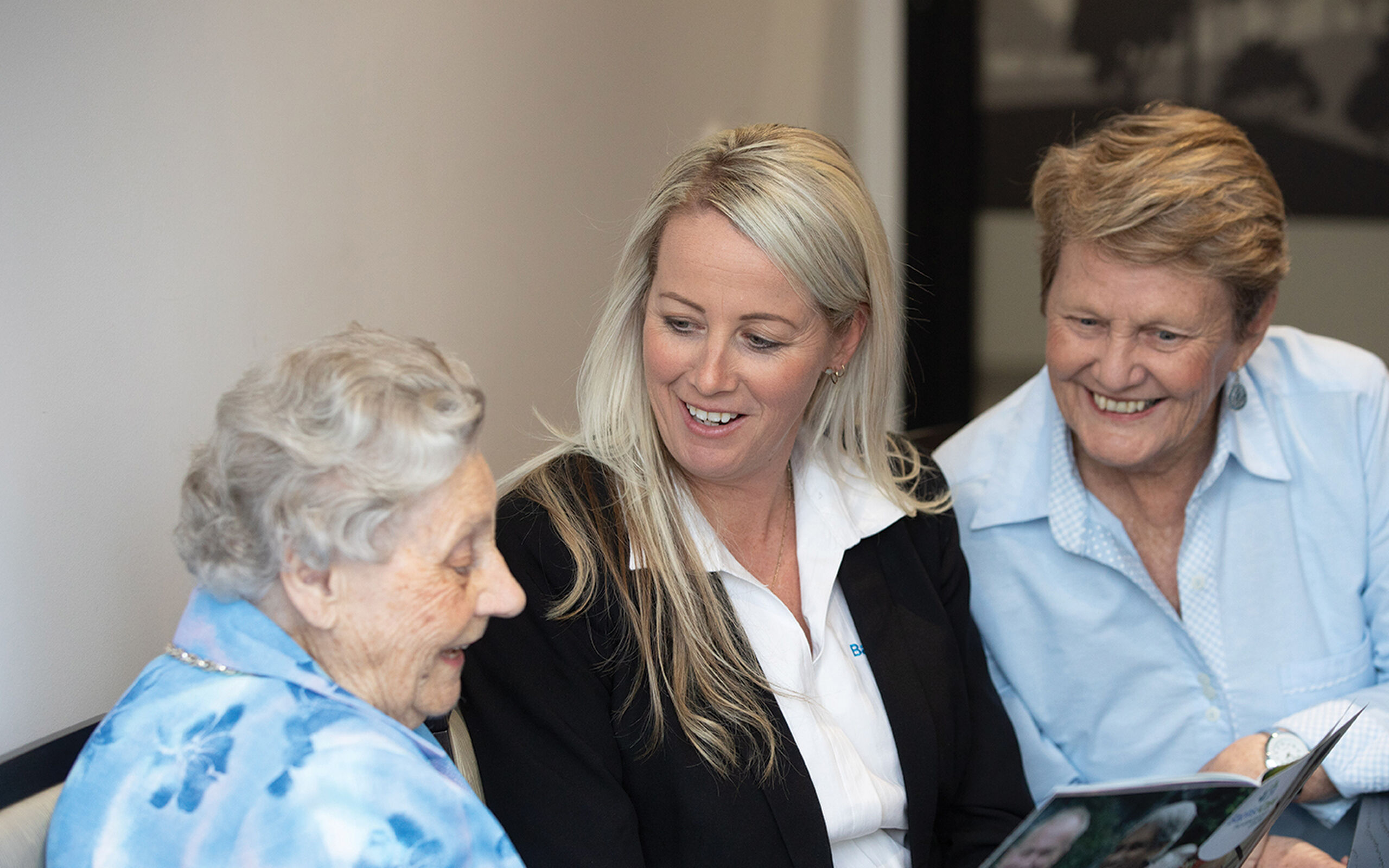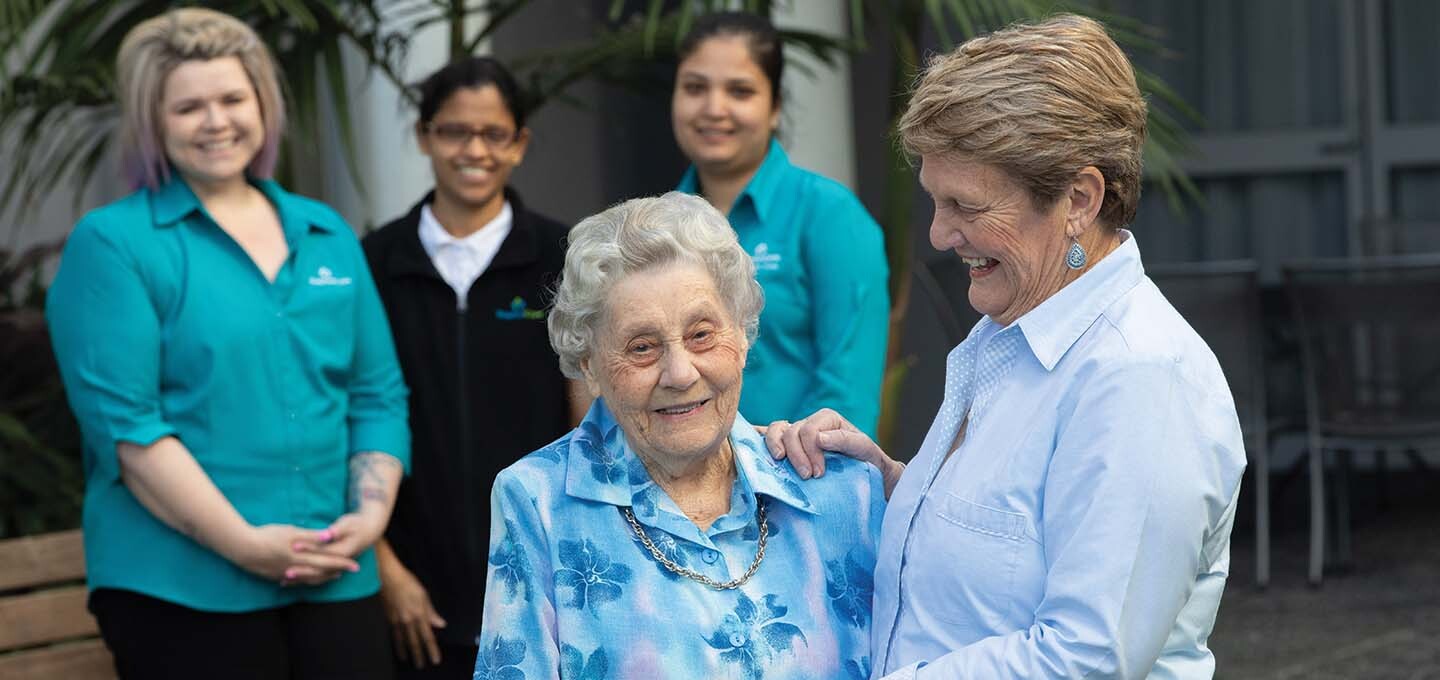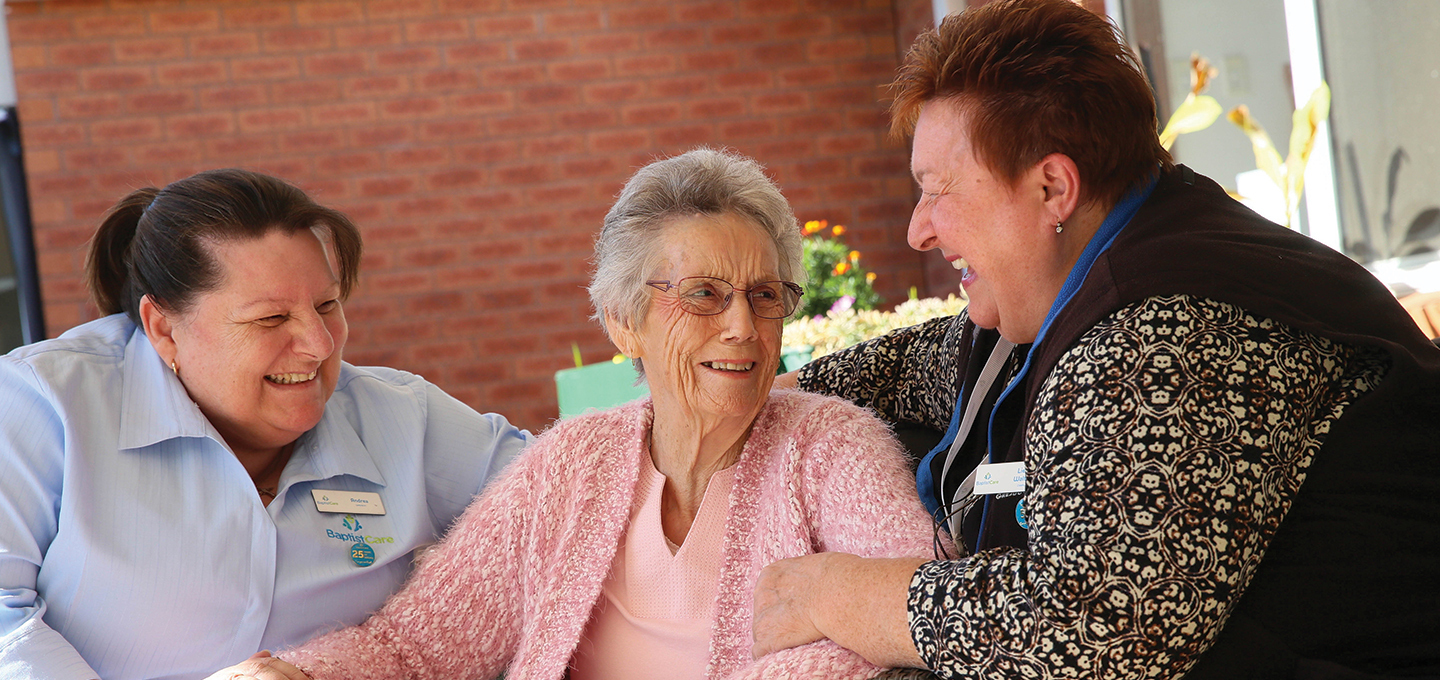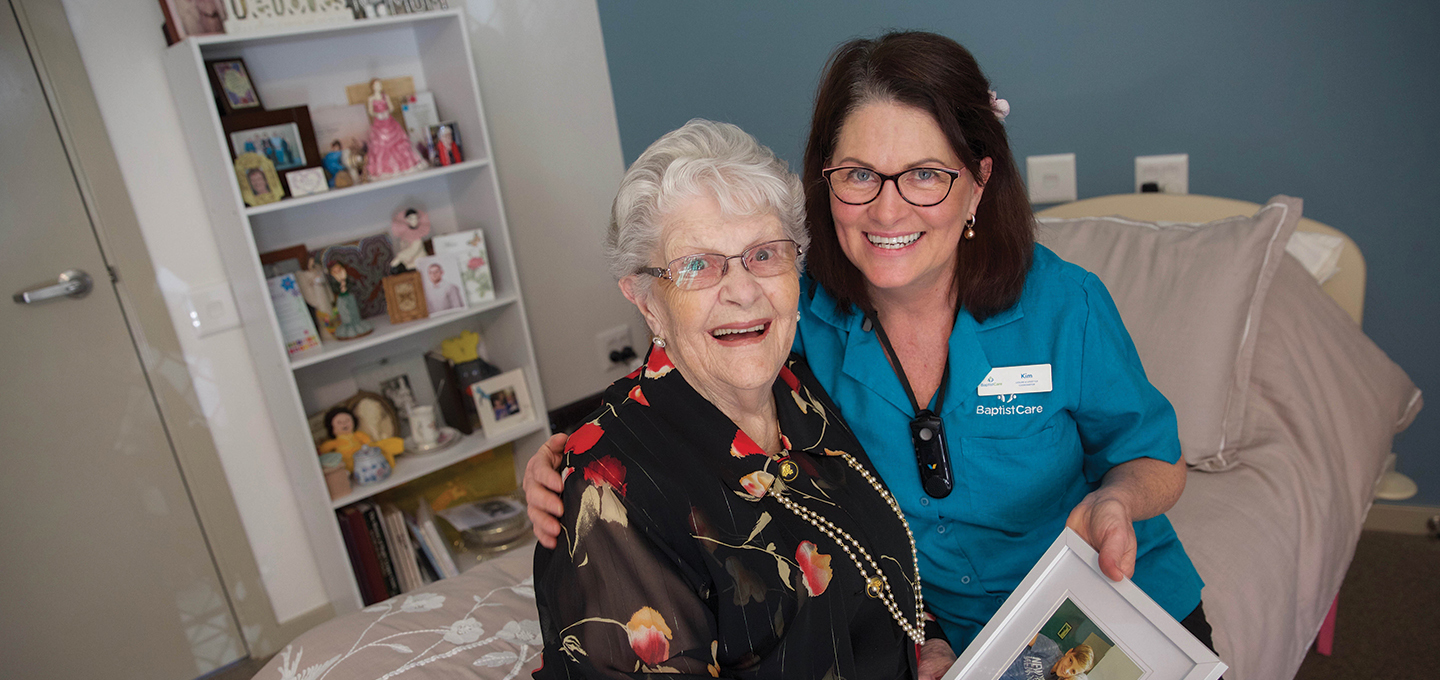The 5 Steps to My Aged Care to access Residential Aged Care
The aged care process can be a really confusing one to navigate, however it’s necessary to move through the steps to access government-funded care in an aged care Home in Australia.
Scroll to Explore

02 September 2022
Stories
| Aged Care Homes
The Five Steps to My Aged Care to access Residential Aged Care
The aged care process can be a really confusing one to navigate, however it’s necessary to move through the steps to access government-funded care in an aged care home in Australia. Our BaptistCare team are always here to help, and this article helps outline the My Aged Care steps you need to take in a simple and easy-to-read manner so you can understand the process better.
Accessing residential aged care in Australia
You or a representative you nominate can apply for a care assessment by contacting My Aged Care. Your local Aged Care Assessment Team (ACAT) will arrange to assess your care needs. The Assessor (usually a nurse, social worker or other health care professional) will make a formal decision regarding your eligibility for entry into an aged care home. You will receive a formal letter and support plan that sets out the care you are approved to receive. You will also receive a unique referral code, that you give to your chosen aged care provider, if and when you choose to go into an aged care home.

Here are the five steps that My Aged Care outlines, which you need to take once you understand what your approved care includes:
Step 1. Work out the actual costs
There are various fees you may be asked to pay including:
Basic Daily Fee
This fee is used for your day-to-day living cost such as meals, cleaning, laundry and electricity. Everyone is required to pay this fee when moving into Residential Care. This Basic Daily Fee is 85% of the single aged pension and is reviewed twice a year in March and September by the Department. In some cases, this may be the only fee you are required to pay.
Services Plus
BaptistCare strives to provide an environment where our residents receive a high standard of loving, respectful, reliable and empowering care, with lifestyle choices and services designed to benefit everyone. Services Plus is a program of Additional Services designed to add to the residents’ comfort and quality of life as the Government only funds the basic care needs. These services are heavily subsidised by BaptistCare. The services enable you to have additional entertainment and lifestyle choices to make your time with us more enjoyable. You can read more on Services Plus here Aged Care Financial Guide | BaptistCare.
Accommodation Costs
This cost will contribute to the accommodation in Residential Aged Care. Some people will have their Accommodation Payment covered in full or partially by the Government, while others will be required to pay the agreed amount in the key feature statement issued by BaptistCare. If you are required to pay an Accommodation Payment, there are 4 different ways you can contribute:
- Lump-sum ‘Refundable Accommodation Deposit’ (RAD) – this is a lump-sum payment that will be refunded in full when you leave the home
- Daily Accommodation Payment (DAP) - is like a rental style daily payment. The DAP is calculated by the interest on the unpaid RAD amount. Just like rent, there will be no refund when you leave the home.
- Combination of both a Lump-sum ‘Refundable Accommodation Deposit’ (RAD) and Daily Accommodation Payment (DAP) – this accommodation option allows you to pay a partial lump-sum amount which will reduce the Daily Accommodation Payment.
- Combination of Lump Sum Refundable Deposit (RAD) and a variable Daily Payment (DAP) which is to be drawn down from the agreed lump sum amount – this option allows you to drawdown the DAP from the lump sum amount. This will reduce the lump sum amount available for refund when you leave.
All residents have up to 28 days after the date of entry to decide how they would like to pay their Accommodation Payment. You will be asked to pay the DAP amount until you decide which option you choose to pay.
Means Tested Fee
If your income and assets are over a certain amount, you may be asked to contribute towards the cost of your care. Services Australia or the Department of Veterans' Affairs will let you know if you need to pay this fee and the amount will be based on your means assessment. There is an annual and lifetime cap applicable for this fee. The Department also conducts quarterly reviews and may adjust your Means Tested Fee if your circumstances have changed during the last quarter.
You’ll need to apply with the following form to the appropriate department:
Permanent Residential Aged Care Request for a Combined Assets and Income Assessment (SA457) form
Once you have completed the above form, you will get a fee advice letter. Take the letter along to any potential aged care providers so they can help you understand the full cost of living in their home. Once you’ve settled in, you’ll receive another letter outlining the maximum fees you may be asked to pay, including your basic daily fee, your means-tested care fee (if any), and your accommodation fee (if any).

Step 2: Find an aged care Home
When considering an aged care home, it’s important to select one with the care and services you need now, and also accommodate your needs in the future. There are a lot of things to think about, including the type of accommodation available, the services, care and activities you can access. Do the values of the home align with your own? How can your individual needs be met? Can you afford it? And how much do additional services cost?
You can search for local providers in your area by using the service finder here:
www.myagedcare.gov.au/service-finder/aged-care-homes
You can also find a BaptistCare aged care Home across New South Wales and the ACT here:
https://baptistcare.org.au/locations/aged-care-home-locations
Meet your care provider
It’s a good idea to know what you want out of an aged care home prior to visiting any. Take notes when you do visit so you can differentiate the pros and cons in your decision-making. When you meet your potential aged care home providers take your letter and referral code previously mentioned along, as well as your fee notification letter from your financial assessment if you already have one. This will play an important part in understanding the costs of your ongoing care.
You can ask as many questions as you like. Try to gain an understanding of what care services are provided and not provided, and what you will have to pay extra for.
Step 3: Apply to an aged care home and accept offer
When you find the aged care home for you, you can apply for a placement. You can do so with as many homes as you like as your preferred home may not have an availability for you at the time that you need it. Once a placement becomes available the aged care home will be in contact with you or your nominated person.
This step usually involves filling out an application form. Every aged care home has their own application process. Discuss with them what information they need from you. You will have to supply the unique referral code we mentioned earlier from your ACAT assessor. This will enable the provider to view your current record of needs and allocated services, and consider your care moving forward.
Once a placement becomes available and you accept the offer, the provider will provide a formal agreement that covers services, accommodation, and your rights and responsibilities.
Step 4: Enter into an agreement with your aged care home
After you have accepted the offer from your provider of choice, they will issue you with an agreement prior to moving in. The agreement is a legally binding document between you, the care recipient, and your aged care home.
The agreement sets the care and services available, the fees you will have to pay, how the fees will be paid, and your rights and responsibilities. Make sure it covers all the things you believe to be important and be sure that you understand everything before you sign it. If you have any questions, your Client Liaison Team member will be more than happy to explain it further with you.
You can always check with a financial advisor or legal professional to help you understand the terms of the agreements. If you require an advocate, you can call the National Aged Care Advocacy Line on 1800 700 600.
After you move in, you have 28 days to decide how you wish to pay for your expenses and enter into an accommodation agreement. Both you and your chosen provider have responsibilities under the Charter of Care Recipients’ Rights and Responsibilities – Residential Care.

Step 5: Manage your care and services
Once you are settled into your new home, you have the choice to keep your own doctor, dentist and specialists if they agree to visit you at the home otherwise the home can work with you to arrange new doctors to look after you. Your aged care home can help you make appointments and arrange transport if required.
At BaptistCare, we have social programs and activity officers that can help you continue your hobbies and encourage you to engage in fun events and activities the home organises. These activities and events provide you with a great opportunity to build friendships with other residents.
Socialisation is important for your wellbeing. If you are feeling alone without regular contact with family or friends, you can ask your aged care home for a community visitor which can help provide opportunities for social contact.
Social leave and holidays
You have up to 52 nights in a financial year allocated to social leave (by the Australian Government), where you can visit friends or family. You will still have to pay your usual fees and accommodation costs. If you stay away more than 52 nights, the Australian Government will stop paying subsidies and you may have to make up the difference. Should you be required to go to hospital, it doesn’t count towards your social leave, however, you will still be required to pay your usual expenses.
Changing rooms
Should you not like your room, you can ask to move. The manager of the aged care home will consider your request, even if it isn’t possible right away. There may also be the circumstance that your room is no longer suitable for your health and care needs. Depending on the new allocation, we will need to revise your agreement and the costs may also need revising, for example, if you move from a shared to a single room. In rare circumstances, the aged care home may also delegate a new room. If you have any concerns, you can talk it through with the residential aged care home manager.
Our well-trained staff can support a broad range of care needs to suit each of our residents: from those who are still fairly independent, to the ones with complex needs such as people living with dementia, right through to end of life care. We are here to be that extra support families need in ensuring their loved ones are well cared for and feel safe. Contact BaptistCare to find out how we can help you.
Click the link below to learn more about BaptistCare's
Residential Aged Care | MyTeam | Understanding Aged Care | Financial Guide | Find a centre
Make an Enquiry
If you would like to know more, please contact us on 1300 275 227 or complete the enquiry form and one of our customer representatives will be in touch.